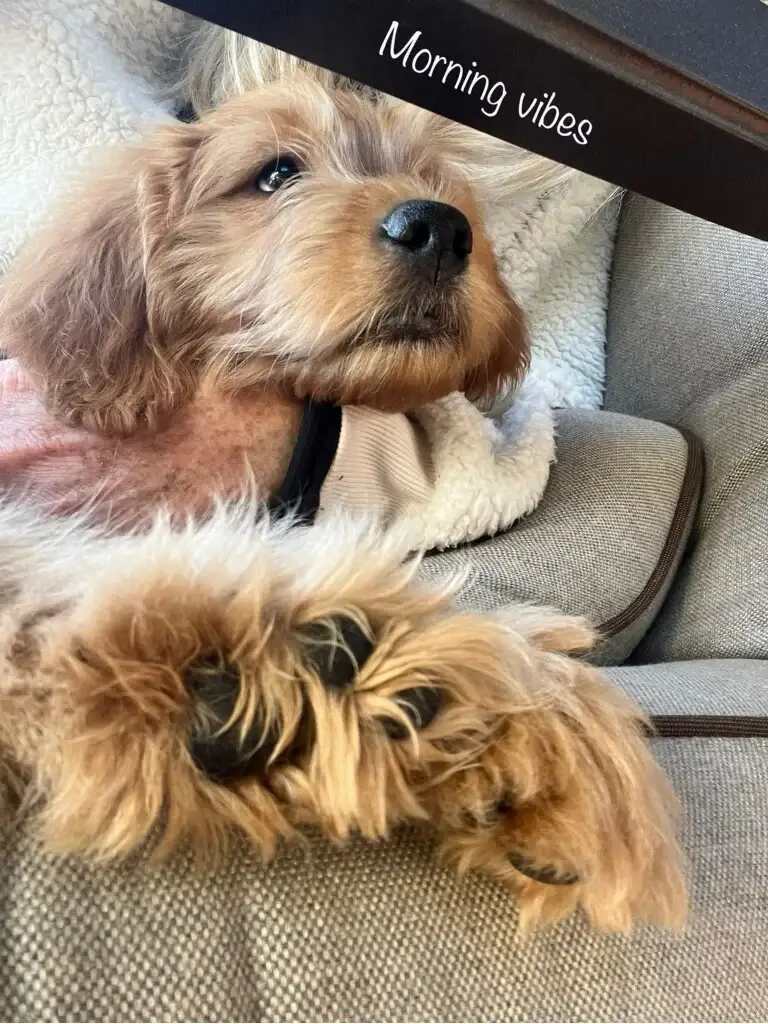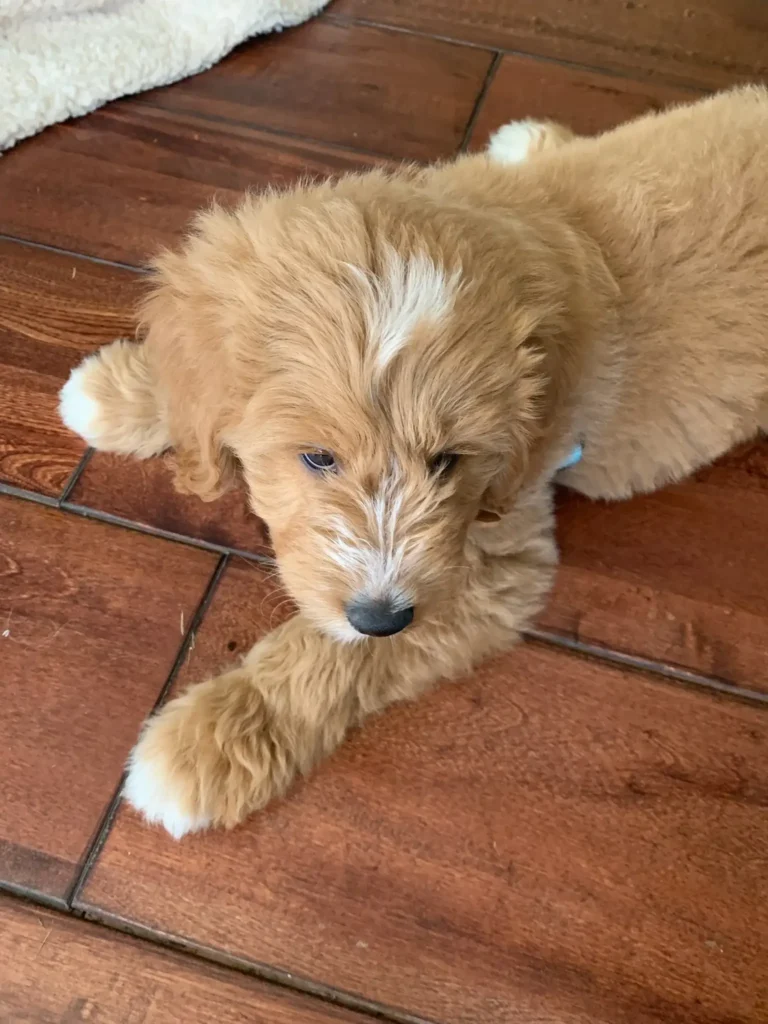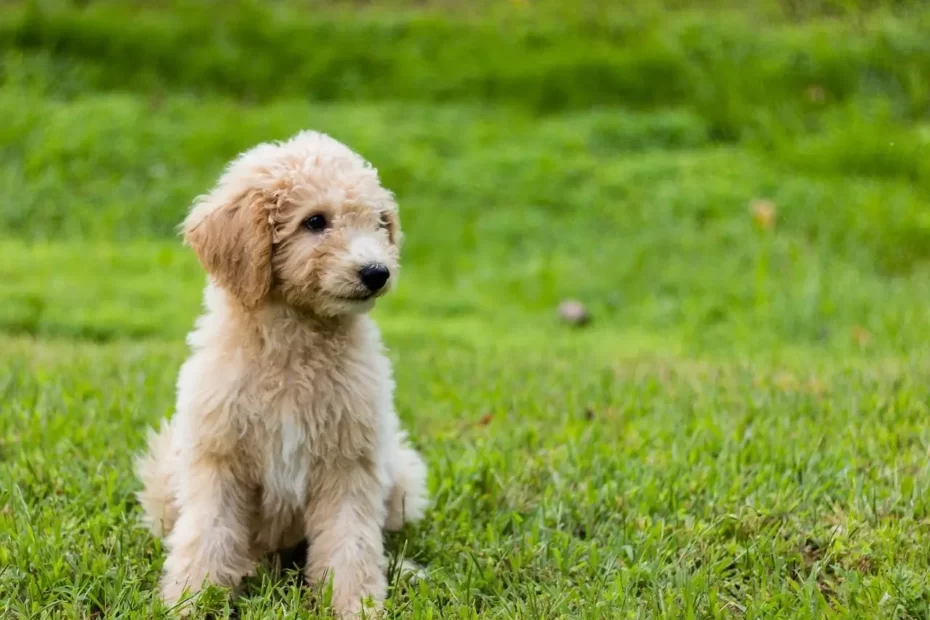Goldendoodle Breed Information
Are you considering adding a Goldendoodle puppy to your family? Before you take the plunge, there are some important things you should know! From grooming needs to exercise requirements, we’ve got all the insider tips to help you prepare for life with your new furry friend. Read on for 7 essential things to consider before bringing home a Goldendoodle puppy!
What is a Goldendoodle, Mini Golden Retriever, Groodle, and a Goldenpoo?
Goldendoodles, also known as Groodles or Goldenpoos, have become increasingly popular in recent years. They are often referred to as designer dogs because they are a cross between two purebred breeds – the Golden Retriever and the Poodle. This unique combination results in an adorable and intelligent hybrid breed that has captured the hearts of many dog lovers.
The origins of Goldendoodles can be traced back to the 1990s when breeders began crossing Poodles with other breeds in an attempt to create hypoallergenic dogs. The result was a cross between the gentle and friendly nature of Golden Retrievers and the intelligence and low-shedding coat of Poodles.
Miniature Golden Retrievers: also known as Petite Goldens or Mini Goldens, are simply smaller versions of traditional Golden Retrievers. They are created by breeding Golden Retrievers with either Toy or Miniature Poodles, Cocker Spaniels, or Cavaliers. The aim is to produce smaller-sized dogs while retaining all the desirable traits of their larger counterparts.
Groodles: Essentially another name for Goldendoodles but are more commonly used in Australia. Goldenpoos: Similarly, Goldenpoos refer to Goldendoodles but are typically found in Europe. These names were coined by breeders to differentiate their particular lineages from others.
Goldendoodles, Mini Goldens, Groodles, and Goldenpoos all share similar characteristics that make them great family pets. They are known for their friendly, sociable nature and intelligence, making them easy to train. Their hypoallergenic coats also make them suitable for families with allergies that will surely bring joy into any household..

Doodle Generations Explained: F1, F1B, F2, F2B, Multi Gen
As the popularity of Goldendoodles continues to rise, so does the variety of generations and hybrids within this breed. Understanding these different generations is important for potential owners as it can impact the characteristics and traits of their future Goldendoodle puppy.
F1 – First Generation
The term “F1” refers to a first-generation Goldendoodle, meaning that the pup is a direct cross of a purebred Golden Retriever and a Poodle. This is often considered the most desirable generation for those who want to ensure consistent traits from both parent breeds. As with any hybrid breed, there is still some degree of variation in appearance and temperament among individual puppies.
F1B – Backcross Generation
An “F1B” Goldendoodle results from crossing an F1 Goldendoodle with either a purebred Poodle or a Golden Retriever. This creates even more consistency in terms of coat type and overall appearance as you have either 75% Poodle or 75% Golden Retriever. In most cases, it will be more poodle genetics than Golden Retriever. These puppies tend to have curlier coats than their F1 counterparts due to the increased influence of the Poodle genetics.
F2 – Second Generation
An “F2” generation occurs when two F1 Goldendoodles are bred together. While this may seem like an obvious choice for breeding purposes, it can potentially create more variation in terms of physical traits and personalities compared to an F1 litter. Some puppies may lean more towards one parent breed than the other or exhibit traits not seen in their parents.
F2B – Backcross Second Generation
The “F2B” generation comes from backcrossing an F2 with either a purebred Poodle or a Golden Retriever. This usually results in puppies that resemble an F2 but with slightly less variation in traits and coat type. F2B puppies may also have a higher chance of inheriting the desired non-shedding gene from their Poodle parent.
Multi-Gen
A “Multi-Gen” Goldendoodle is a result of breeding two Goldendoodles together, typically an F1 or F2 or with another Multi-Gen.
Understanding the different generations within the Goldendoodle breed can help potential owners choose the right puppy for their lifestyle and preferences. While each generation has its unique characteristics, all Goldendoodles share common traits such as intelligence, an affectionate nature, and a love for human companionship. Whether you opt for an F1 or Multi-Gen pup, bringing home a Goldendoodle is sure to bring joy and love into your life.

What type of coat does a Goldendoodle have
One of the most common questions asked by potential Goldendoodle owners is, “What type of coat does a Goldendoodle have?”
The Goldendoodle’s coat can vary greatly depending on which parent they take after more and if they are 75% poodle vs 50% poodle. They can either have wavy hair like their Golden Retriever parent or curly hair like their Poodle parent.
No matter what type of coat your Goldendoodle has, regular grooming is essential in keeping them healthy and happy. With proper grooming and care, your Goldendoodle’s coat will stay healthy and beautiful throughout their life.

From Mini to Standard: How Big Do Goldendoodles Get?
Size of a Standard Goldendoodle
A Standard Goldendoodle is the largest size category for this breed and typically weighs between 50-90 pounds and stands at 20-24 inches tall at the shoulder. They are considered to be medium to large-sized dogs, making them an excellent choice for families or individuals looking for a larger companion.
Size of a Medium Goldendoodle
Medium Goldendoodles are a popular choice among families due to their manageable size and lovable personalities. Their size can vary based on genetics, lifestyle choices, and gender, but they typically fall within the range of 17-20 inches in height and 30-45 pounds in weight. No matter the specific size of your furry friend, what matters most is providing them with love, care, and attention to ensure they live a happy and healthy life.
How Big Do Mini Goldendoodles Get
As a minor variation of the popular Goldendoodle breed, the mini Goldendoodle can reach a height of 16 to 20 inches and weigh 20 to 40 pounds. On average, they tend to weigh between 20 and 35 pounds and reach a height of 16 to 18 inches.
Different Types of Goldendoodle F1, F1b, Multi Generational
When it comes to Goldendoodles, their size will depend on whether they have been bred with a Standard, Miniature, or Toy Poodle parent. If one parent is a Standard Poodle and the other is a Golden Retriever, then the resulting offspring will be classified as standard-sized Goldendoodles. Similarly, if one parent is a Miniature or Toy Poodle and the other is a Golden Retriever, then the offspring will be smaller in size.
The generation of parents also plays an essential role in determining the size of your Goldendoodle puppy. There are three main generations when it comes to Goldendoodles – F1 (first-generation), F1B (first-generation backcross), and Multigen (multigenerational).
F1 Goldendoodle: has one Golden Retriever parent and one Poodle parent; therefore they are considered first-generation hybrids. These puppies tend to be larger than F1Bs or multigenerational puppies due to their hybrid vigor.
F1B Goldendoodles: have one Goldendoodle parent (usually an F1) and one purebred poodle parent. This backcrossing results in a smaller-sized Goldendoodle, as the Poodle genes are more dominant.
Multigenerational Goldendoodles: are produced by breeding two Goldendoodles together. These puppies have a higher chance of inheriting specific traits from their parents, including size.
It is essential to consider the size of both Poodle and Golden Retriever parents before bringing home a Goldendoodle puppy. If you live in an apartment or have limited space, a smaller-sized Goldendoodle may be more suitable for your lifestyle. However, if you have enough room and love larger dogs, then a standard-sized Goldendoodle might be the perfect choice for you.
It’s important to note that while these sizes provide general guidelines for each generation of Goldendoodles, there can still be variations within each litter due to genetic inheritance. The size of your dog can also depend on their diet, exercise routine, and health. By understanding these factors and communicating with the breeder, you can have a better idea of what size your Goldendoodle will grow to be.

Personality of a Goldendoodle
- Intelligent and Trainable: Both Poodles and Golden Retrievers are known for their intelligence. Making their offspring highly trainable and eager to please their owners. With proper training and socialization, Goldendoodles can excel at various tasks such as obedience, agility, and therapy work.
- Friendly and Sociable: Being a mix of two friendly breeds, it’s no surprise that Goldendoodles have an outgoing and sociable personality. They love meeting new people and getting along well with children, making them excellent family pets. Their friendly nature also makes them poor guard dogs as they’re more likely to greet strangers with wagging tails rather than barks.
- Active Yet Gentle: As descendants of sporting dogs like Golden Retrievers, Goldendoodles have high energy levels and require daily walks or playtime to keep them happy and healthy. Making them great companions for outdoor activities such as hiking or swimming due to their agility and love for water. However, despite their active nature, they are gentle by temperament which makes them suitable for families with young children or other pets.
- Affectionate Companions: One trait that sets Goldendoodles apart from other breeds is their unwavering devotion towards their owners. These dogs thrive on human companionship and attention and can easily become attached to their families – often following them around the house or snuggling up next to them on the couch. Their affectionate nature also means they can experience separation anxiety if left alone for a while.
Are Goldendoodles Hypoallergenic?
Firstly, let’s define what hypoallergenic means for dogs. A hypoallergenic pet is less likely to trigger allergic reactions in humans. This does not mean that these dogs are completely allergen-free, but rather that they produce fewer allergens compared to other breeds.
Goldendoodles are often advertised as being hypoallergenic due to their Poodle heritage. Poodles are known for their low-shedding coats which produce minimal dander (dead skin cells)– the main culprits behind allergies. As a result, Goldendoodles inherit this trait from their Poodle parent and tend to shed less than other breeds.
However, it is important to note that no dog breed can be 100% guaranteed hypoallergenic. The amount of shedding and the level of allergens produced can vary even within the same breed or litter of puppies. This means that while some Goldendoodle puppies may be suitable for individuals with mild allergies, others may still trigger reactions.
Another factor that can affect whether a Goldendoodle is truly hypoallergenic is its coat type. These lovable pups come in three different coat types – curly, wavy, or straight – varying on which parent they take after more strongly. Curly-coated Goldendoodles tend to be more suitable for allergy sufferers as they shed less and produce less dander compared to wavy or straight-coated ones.
It’s also worth noting that grooming plays an important role in managing potential allergies when it comes to Goldendoodles. Regular grooming can help remove any loose fur and dander from the coat. This will not only keep your pup looking neat and tidy but also minimize the amount of allergens they produce.
While Goldendoodles may be classified as hypoallergenic due to their low-shedding coats and Poodle heritage, it is important to do further research on individual puppies and their coat types before assuming they are suitable for allergy sufferers. It is always recommended to spend some time with a puppy or its parents before making a decision, especially if allergies are a concern.

Exercise Needs of a Goldendoodle
The specific exercise requirements of a Goldendoodle may vary depending on age, size, and overall health.
As a general rule of thumb, adult Goldendoodles require at least 30 minutes to an hour of daily exercise while puppies may need shorter bursts of activity throughout the day.
One great way to meet your Goldendoodle’s exercise needs is through regular walks or jogs. These pups have high energy levels and enjoy being outside, making them great companions for outdoor activities such as hiking or running. Just be mindful not to overdo it with strenuous exercises as this breed can be prone to joint issues.
Apart from physical activity, mental stimulation is also crucial for these intelligent breeds. Such as interactive playtime with puzzle toys or training sessions using positive reinforcement techniques. This will not only keep them physically fit but also prevent destructive behaviors due to boredom.
It is also worth noting that Goldendoodles benefit in homes with fenced yards letting them safely run around and expend their energy freely. If you live in an apartment or do not have access to a yard, make sure your dog gets enough time outdoors through regular walks or trips to the park.
Providing adequate exercise for your Goldendoodle is essential for maintaining their physical and mental well-being. Remember to always consult with your veterinarian for personalized recommendations on meeting your Goldendoodle’s exercise needs.
Do Goldendoodle Make Good Service Dogs?
Service dogs are trained to help people with disabilities or special needs, such as physical limitations, sensory impairments, or psychiatric conditions. They can perform tasks such as retrieving things, helping open doors, providing emotional support, and alerting their owners of potential dangers.
One of the main reasons why Goldendoodles make great service dogs is their high level of intelligence. Both Golden Retrievers and Poodles are known for their intelligence and ability to learn quickly. This makes them ideal candidates for service dog training as they can easily pick up on new commands and tasks.
Moreover, Goldendoodles have an eager-to-please attitude and thrive on human interaction. These traits make them highly trainable and willing to work with their handlers towards achieving specific goals.
Additionally, Goldendoodles have a calm demeanor that is essential for service dogs. They are not overly aggressive or excitable like some other breeds, making them suitable for working in public settings without causing any disturbances.
Their friendly nature also plays an important role in being effective service dogs. Goldendoodles have been bred to be sociable companion animals; hence they do well with people of all ages including children. This makes them well-suited for interacting with strangers while accompanying their owners in public places.
Furthermore, the coat type of Goldendoodles makes them ideal for people with allergies who require a hypoallergenic service dog. Their non-shedding coats reduce the amount of dander present in the environment which is often the cause of allergic reactions in humans.
However, it’s important to note that not all Goldendoodles will make good service dogs. While many possess desirable traits such as intelligence and trainability, each dog is an individual with its own personality. It’s crucial to choose a Goldendoodle puppy from a reputable breeder who can provide information on the temperament and health of the parents.
Goldendoodles have all the qualities that make them excellent service dogs – intelligence, trainability, friendly nature, hypoallergenic coat, and calm demeanor. With the proper amount of training and socialization, they can become reliable companions for individuals with disabilities or special needs.
However, it’s essential to do thorough research for a good breeder before bringing home a Goldendoodle puppy as not every dog will be suitable for service work.

What Color is a Goldendoodle?
When it comes to the color of a Goldendoodle, there is no one set standard.
The most common colors for a Goldendoodle are shades of cream, apricot, and gold. This is because both the Golden Retriever and Poodle have these coat colors as their main genetic traits. However, there are also other possible colors such as black and white due to the poodle’s genetics.
Goldendoodle Breeder
Are you ready to reserve a cute cuddly Goldendoodle Puppy? If so, why wait?
Golden Crest Retrievers & Doodles is a Goldendoodle breed in Colorado who have helped many Goldendoodle lovers and first-time Goldendoodle owners find their next furry friend and would love to help you, too. Our team can assist you in finding the right puppy by completing our Puppy Application.
